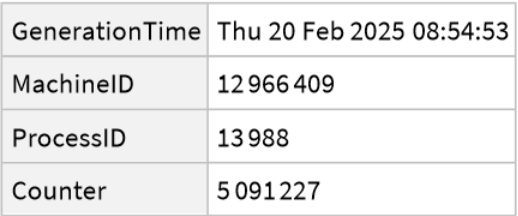Wolfram Function Repository
Instant-use add-on functions for the Wolfram Language
Function Repository Resource:
Generate unique BSON IDs for MongoDB in Wolfram Language
ResourceFunction["GenerateBSONObjectID"][] generates a unique BSONObjectID for inserting data into a MongoDB database. | |
ResourceFunction["GenerateBSONObjectID"][n] generates n unique IDs. |
Generate a unique ID for a MongoDB:
| In[1]:= |
| Out[1]= |
Check the properties of the generated ID:
| In[2]:= |
| Out[2]= |  |
Generate multiple IDs at once:
| In[3]:= |
| Out[3]= |  |
Wolfram Language 14.0 (January 2024) or above
This work is licensed under a Creative Commons Attribution 4.0 International License